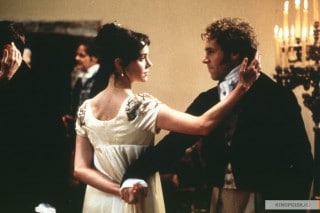Eye For Film >> Movies >> Mansfield Park (1999) Film Review
Mansfield Park
Reviewed by: Angus Wolfe Murray

The last time Jane Austen was taken in hand and given a shake was when Emma Thompson adapted Sense And Sensibility for the Taiwanese director, Ang Lee. The result delighted critics and audiences alike.
The Canadian director, Patricia Rozema (I've Heard The Mermaids Singing, When Night Is Falling) would be incapable of creating a crinoline soap in the style that it was accustomed. She is a filmmaker of courageous intent and idiosyncratic imagination. Austen should be wary of her.

Fresh blood, especially foreign, can only be beneficial to what has become an exercise in good taste. Rozema's reworking of Mansfield Park incorporates Austen's early writing and diaries, as well as simplifying the story and introducing the politics of the bedroom.
Fanny Price (Frances O'Connor) is brought from relative poverty to the big house by her aunt and allowed to share the privilege of the Bertram family, whose fortune comes from slavery in the West Indies.
Sir Thomas (Harold Pinter) is the powerful patriarch whose eldest son prefers to debauch himself on the plantations, while his youngest (Jonny Lee Miller) stays at home, preparing in a vague sort of way for the only job available to him - the clergy.
Rozema avoids the grandeur you might expect from a 19th century comedy of manners. The house has a spartan feel to it, no carpets on the bare boards, precious little decoration. At the ball, she succeeds, with slow motion and close-up, to imply intense sensual excitement in what always appeared in other films to be incomprehensible formal dancing.
Naturally, the plot concerns itself with love and marriage, the former a painful secret, the latter "a manouvering business." Fanny has an independence of mind and no cash. She is expected to accept the proposal of the first suitable society cad who has the temerity to ask her, while she knows whom she loves and he is not available.
O'Connor has an intelligence and sympathy that gives Fanny genuine character. If Austen saw her as a mouse, Rozema does not and O'Connor confirms it. The dominant figure in every scene at Mansfield is Pinter. You forget that like John Osborne, he began life as an actor. He has a brooding, predatory eye and fierce leonine presence.
By breaking the seal, Rozema has freed costume drama from the shackles of tradition, exposing its naked flesh. The window that Thompson unsnibbed has been flung wide. Fresh air tastes good.
Reviewed on: 19 Jan 2001

















